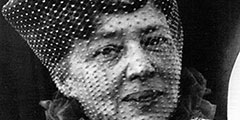Zedlitzgasse 7, 1010 Vienna
Do you know the Bertha von Suttner street?
– Most likely not, since …
… a Bertha-von-Suttner Street exists only as a short stretch of road on the periphery of Vienna at the outskirts of Kagran, unfortunately a rather run down street, containing a sports field and advertisement boards. It is incomprehensible that, up to now, the city of Vienna only finds this stretch of road suitable for the topographic memorial culture for this great woman. It is a scandal, one cannot call it anything else! In the 1st district, in the house Zedlitzgasse 7 Bertha von Suttner lived since 1902 until her death in 1914. She lived here when she received the Nobel Peace Prize in 1905. No plaque exists on the front of the house to remind one of her. (Inside the house there is at least a memorial plaque).
The comparison with the cared-for site and the grandiose memorial in honour of Mayor Karl Lueger just round the corner raise many questions. Suttner and Lueger lived at the same time in the same city.
Why is one appreciated so very much and the other not appreciated at all?
Bertha von Suttner, 9 June 1843 -21 June 1914; pacifist, author, was in her time worldwide the most famous female person engaged in peace matters; she urged her friend and benefactor Alfred Nobel to decree the Nobel Peace Prize in his testament; 1905 she was the first woman to receive this prestigious prize; 1891 she established together with her husband, Arthur von Suttner, the ‘Association for Resistance to Anti-Semitism’.
It was a courageous act to rise against the statements of Christian churches and many personalities in leading positions abounded with malicious anti-Jewish attacks. For her engagement against the socially acceptable aggressive anti-Semitism Bertha von Suttner was often reviled as ‘Jew Bertha’ in the media. Until her death, she warned in numerous lectures and texts of the aftermath of the eager-for-war arming that then lead to the horrendous First World War in Europe.
“Bertha von Suttner and Dr. Karl Lueger, they both lived in Vienna at the same time. What a different history would have developed if her beliefs and initiatives would have prevailed… “






 6 minutes
6 minutes